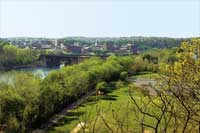This archived account describes the initiative for a State Museum of Transportation in Philllipsburg which eventually failed.
The idea has had time to mature, originating back in 1987 when the original Railroad and Transportation Museum Study Commission began to search for a way to tell the story of New Jersey's rich transportation heritage. New Jersey's credentials as the "birthplace of surface transportation technology and invention" are impressive. John Steven's pioneering steam locomotive, Edison's first electric locomotive, early electric street car technology, advances in steam navigation, the mountain climbing Morris Canal and the first practical railroad in America are lead items in a very long list of state superlatives in the history of American transportation. You can see outstanding collections of New Jersey transportation exhibits... in Pennsylvania, New York, Connecticut, Maryland or Delaware. While there are some fine local rail attractions and sites, there is no comprehensive repository for the images and artifacts of New Jersey's proud and irreplaceable canal, railroad and roadway heritage which will soon oxidize into oblivion or be lost to out-of-state museums.
Several permutations later, and after a long, arduous site selection process, the revitalized Commission, with New Jersey Transit as the contracting agency, finally authorized the preparation of a four-month study to develop a Master Plan for the Phillipsburg site in late 1999. The Phillipsburg area and its surrounding communities in both Pennsylvania and New Jersey are historic transportation hubs. Commerce was conducted on two rivers, three canals, five railroads, five street car and interurban railway companies, and numerous stagecoach, bus and truck enterprises. Phillipsburg was also the terminus of two historic trans-New Jersey turnpikes, and the home of a number of manufacturing companies directly and heavily involved in transportation. Phillipsburg has supported the Heritage Center by enacting a Redevelopment Plan that includes the Heritage Center site, and has created a new Historic-Recreation Zoning District in anticipation of the project. Warren County has also pledged funds to assist in site acquisition.
The Netcong site, located approximately 27 miles northeast of Phillipsburg, has both an active traditional commuter rail line to Hoboken via New Jersey Transit and an early twentieth century, two- story station. The connection will provide an additional rail terminal for railroad excursions to and from the core Heritage Center complex in Phillipsburg. The site in Netcong is also well suited for display of selected artifacts.
The plan depicts the Heritage Center as an exciting interactive experience, employing state-of-the-art interpretive exhibits that feature operating historical vehicles including horse drawn carriages, trolleys, road vehicles, and railroad excursions. Phase One blueprints include

Later construction phases will include vintage storefronts, additional interpretive exhibits, more restored artifacts, a reconstruction of Plane 11 of the Morris Canal, where canal boats were drawn from, or lowered into, the Delaware River, and a trolley-bus excursion from the Easton, PA National Canal Museum facility across the Delaware, on the Lehigh River. Synergy with this and other Lehigh National Heritage Corridor area attractions such as the Crayola Visitors Center, Hugh Moore Canal Park, and the proposed America on Wheels Museum and National Museum of Industrial History in the Allentown/Bethlehem area, are critical in the Master Plan projections. Annual visitation is forecast at roughly 60,000 to the site's interpretive program, and an additional 30,000 to 50,000 visitors attracted to ride regular and special train excursions along the Bel-Del Railroad. Later phases, if fully integrated with surrounding resources, are expected to increase the number of Heritage Center visitors up to 150,000, with an additional 80,000 to 100,000 excursion riders expected annually.
After the designation has passed through the state legislature and the Governor's office, the next step will be to secure approximately $3.7 million in estimated start up costs, including purchase of the site, site preparation and fencing, installation of trackage to store the collection, movement of the collection to the site, etc. The Phase One component of the Master Plan is based on a capital cost budget of approximately $18 million, including the cost of the structures, indoor and outdoor attractions, and "soft costs." The Phase Two budget has been estimated at an additional $22.5 million, depending on when that stage commences. Funds will come from both public and private sources including the state legislature, Warren County, corporate sources, private donors, and grants. Bill McKelvey, Director of the Friends of the NJ Railroad and Transportation Museum explains "This has required a 15 year effort to see the Heritage Center get to where it is today. We are excited and anxiously awaiting the official designation. But even after that, the Center's future will remain largely in the hands of volunteers who continue to work tirelessly."
For more information refer to the following websites: www.urhs.org www.njthc.org, and www.njerhs.org
This archived account describes the initiative for a State Museum of Transportation in Philllipsburg which eventually failed.